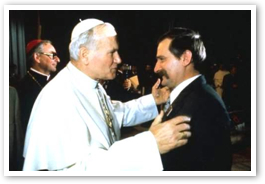Saint Pope John Paul II and Lech Walesa
- FATHER RAYMOND J. DE SOUZA
The year 1979 marked the beginning of the end for communism.
 |
Saint Pope John Paul II and Lech Walesa
|
In January, Deng Xiaoping, having seized power just weeks before, began the economic reforms that would remake Chinese communism. On June 2, 1979, Pope John Paul II returned for his first papal visit to Poland with a more ambitious agenda. He wanted the Soviet communism in his homeland, and throughout Europe, utterly destroyed.
Ten years on, on June 4, 1989, history witnessed the fulfillment of those visions. In China, the 1980s were a decade of rapid economic growth, as the Chinese communists abandoned the supposed heart of communism, common ownership and the class struggle. Deng and his accomplices opted to keep the totalitarian politics. As the winds of liberty swept across the globe in the spring of 1989, Chinese protesters gathered to demand something more than just liberalized markets. They wanted liberty. Deng's vision did not include that, and so the Chinese communists massacred their own people in Tiananmen Square.
In any other year, it would have been simply expected. The Maoist regime had been killing its people by the millions for decades. With a resumé of forced famines, laogai, cultural revolution, systematic suppression of all religious, political and legal liberties, monstrous violations of human rights in the name of population control — how else would one have expected the Chinese regime to react? It was thought that perhaps Deng had brought a new era, as though a desire for export-led development might lead to an importation of respect for human rights.
It didn't. As Deng wound down his public life it was clear that the Chinese were willing, even eager, to jettison the central-planning economics that made communism unsustainable. That was the limit of the tyrant's indulgence. To defend their totalitarian power, the Chinese would crush under their tanks anyone who thought liberty was more than just the freedom to sell cheap goods overseas. Twentyfive years later, the economy is still growing in China, but the winds of liberty still do not blow there. The air in China is both metaphorically and literally unbreathable, the polluted price the Chinese have paid for economic development in a totalitarian state.
On the day the tanks rolled over bodies in Tiananmen Square, millions of Poles were queuing up to vote in the first authentically democratic elections behind the Iron Curtain. Solidarity swept those elections, and before the year was out the winds of liberty had blown down the Berlin Wall. The next year Lech Walesa, the hero of Solidarity, was elected president of Poland and the year after that, the entire evil empire was gone, as the Soviet Union ceased to exist.
Given the choice between continuing sycophancy to a tyrant state and honouring Poland's heroes, world leaders yesterday averted their eyes from Beijing and were present in Warsaw instead.
The lesson of June 4, 1989, is that history is never given. It is shaped by the courage or cowardice of people who can always make a choice... |
"We remember how, when an Iron Curtain descended, you never accepted your fate," U.S. president Barack Obama told his Polish audience. "When a son of Poland ascended to the Chair of Saint Peter, he returned home, and here, in Warsaw, he inspired a nation with his words — 'There can be no just Europe without the independence of Poland.' And today we give thanks for the courage of the Catholic Church and the fearless spirit of Saint John Paul II."
The lesson of June 4, 1989, is that history is never given. It is shaped by the courage or cowardice of people who can always make a choice — even if that choice brings confinement, as it did for Walesa, or carnage, as it did in Tiananmen Square. China is not cursed by fate to remain a tyrant state, oppressing its people, even as neighbouring India is democratic, and Russia has been shorn of its empire.
That lesson is positively confirmed by Poland, where all the dramas of the 20th century took place. On June 4, 1989, Poles declared, in effect, that the horror of Europe's 20th century, birthed in the First World War and Bolshevik Revolution, was over. With deference to Churchill and the English, and to the allies who mark the 70th anniversary of D-Day tomorrow, history will definitively judge that the Polish decade from June 2, 1979, to June 4, 1989, was indeed the 20th century's finest hour.
Twenty-five years on, the choice facing nations remains as it was that day: Will our common life be marked by liberty ordered to moral truth, or by coercive power, even violence? The drama of June 4th remains and will shape the 21st century.
 This is Meaghen Gonzalez, Editor of CERC. I hope you appreciated this piece. We curate these articles especially for believers like you.
This is Meaghen Gonzalez, Editor of CERC. I hope you appreciated this piece. We curate these articles especially for believers like you.
Please show your appreciation by making a $3 donation. CERC is entirely reader supported.

Acknowledgement
Father Raymond J. de Souza, "The triumph and tragedy of 1989." National Post, (Canada) June 5, 2014.
Reprinted with permission of the National Post and Fr. de Souza.
The Author
Father Raymond J. de Souza is the founding editor of Convivium magazine.
Copyright © 2014 National Post



